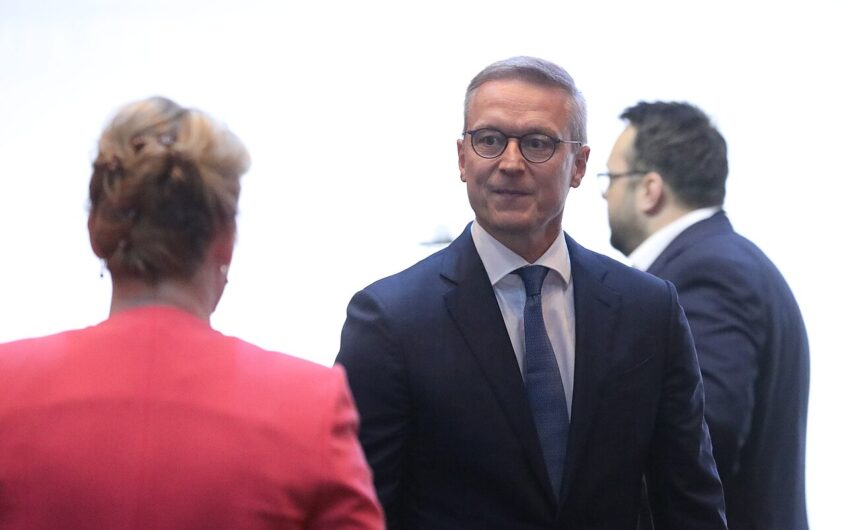
Martin Rulsch via Wikimedia Commons
AGI Profiles: Karsten Wildberger

Katharina Schindel
Halle Foundation/AGI Intern
Katharina Schindel is a summer 2025 Halle Foundation Intern at the American-German Institute. She is a rising second year graduate student in the European Studies program at Georgetown University’s School of Foreign Service, pursuing a concentration in international business and transatlantic diplomacy. Originally from Munich, Germany, Katharina earned her BA in political science and sociology from Ludwig-Maximilians-Universität (LMU), where she focused on EU-U.S. relations, and holds a certificate in U.S. politics from American University’s Washington Semester Program.
Prior to her graduate studies at Georgetown, Katharina worked as a project assistant for the Public Affairs Consultancy APCO Worldwide in Munich, where she provided geopolitical risk analysis for international clients in the tech and security space and supported high-profile political events, such as the Munich Security Conference. In addition, Katharina has further experience in transatlantic policy engagement, having previously served as a fellow at the Friedrich Ebert Foundation in Washington, DC.
Her research interests include the security sphere of the transatlantic relationship (specifically as it pertains to Germany and the United States) and shared issues on the emerging tech frontier for both sides of the Atlantic.
Federal Minister for Digital and State Modernization
Karsten Wildberger is a newcomer in more ways than one. His appointment as Germany’s first-ever Minister for Digital and State Modernization appeared as a surprise to many in Berlin. A physicist by training and corporate executive by profession, Wildberger was, until days before his taking office, the CEO of Ceconomy AG, the parent company of German consumer electronics giants MediaMarkt and Saturn. With no prior political office and no party affiliation until joining the CDU in May 2025 (shortly after his swearing-in), his direct leap into what could be one of the most powerful new ministries under Chancellor Friedrich Merz is a bold statement on Germany’s evolving approach to governance.
Personal Background and Education
Wildberger hails from Gießen, a city in western Germany. He holds a PhD in Physics, having studied at the Technical University of Munich and RWTH Aachen University. His early professional career began at Boston Consulting Group, followed by executive roles at T-Mobile, Vodafone, and Telstra. From 2016 until his move to Ceconomy in 2021, Wildberger was a member of the Executive Board at the energy firm E.ON. His area of responsibility comprised digital transformation within the company.
Previous Experience: Corporate Rather than Political
In the weeks ahead of the new German government officially forming, there were reports that the chancellor would appoint a person from outside of the political ranks to the digital ministry. Lists of Merz’s possible choices of ministers had been circulating, with the position for the digital ministry having been one of the more unclear ones in the run-up to its announcement. The choice of Karsten Wildberger, however, was a surprise in the political circles of Berlin, given that his name had not appeared on experts’ radars beforehand—even among those who had been expecting Merz’s government to establish a digitalization ministry. “I believe everybody was surprised,” said Lena-Sophie Müller, head of Initiative D21, a digital society network that works both with the private sector and the government. She told Deutsche Welle, “I called a couple of people in my network, and I was like, ‘Do you know him?’ Nobody really knew him.”
Even Wildberger appeared to have been caught slightly off guard by his selection to be part of Chancellor Merz’s new Cabinet. “It all happened rather suddenly,” he admitted during one of his first public appearances in late April, as he spoke at the formal handover ceremony at the office of outgoing Federal Minister for Digital and Transport Volker Wissing.
The pace of events did not slow after his swearing-in. Although Wildberger was officially unaffiliated with any political party at the time of his appointment, he formally joined the Christian Democratic Union (CDU) just weeks later by registering with his local party chapter in North Rhine-Westphalia. “North Rhine-Westphalia became my home a long time ago, and the CDU has long felt like my political home—even if I had not yet made it official,” he said. He added that the Christian Democrats “stand for a strong social market economy and a necessary shift in policy, especially in the realms of digitalization and modernizing the state.”
While Wildberger is a newcomer to public office and formal party politics, he is not a completely unknown quantity in the policy sphere. He previously served as Vice President of the CDU-aligned Economic Council, an influential industry association that lobbies on behalf of business interests. In recent years, he’s made an effort to shape public debate more directly. In the fall of 2024, amid concerns over Germany’s sluggish uptake of electric vehicles, Wildberger proposed that electronics retailers like MediaMarkt and Saturn could begin selling electric vehicles in-store, citing examples from Italy and Spain.
A Strategic Pick
Chancellor Friedrich Merz’s selection of Wildberger fits into a broader pattern: recruiting business leaders to reform public administration. According to reports, Merz faced some rejections before landing Wildberger, as the drastic pay cut from CEO (€2.8 million per year) to minister (€200,000 per year) dissuaded many executives.
In picking Wildberger, Merz has placed a more technocratic figure, rather than a run-of-the-mill politician, at the helm of a signature project. Perhaps equally as surprising as his appointment has been to some is the rather unusual special structure and power that Wildberger’s ministry has been given: Merz notably handed him more consolidated authority than any other digital official in Germany’s modern history.
New Office and New Responsibilities
As head of Germany’s newly created Ministry for Digitalization and State Modernization, Wildberger has been handed a portfolio that centralizes responsibilities previously scattered across six ministries and the Chancellery. While most ministries received brief task lists through the government’s organizational decree, Wildberger’s mandate spanned over two pages.
Among his new responsibilities: shaping digital policy at the federal level, overseeing the government’s IT infrastructure and cybersecurity, managing the rollout of digital ID systems, and coordinating Germany’s implementation of EU AI regulations. He also takes over control of key elements from the ministries of Economy, Finance, Justice, and Interior. Most notably, Wildberger has been granted a rare budgetary power: a spending veto over other ministries’ major IT projects. This is an authority typically reserved for the Finance Ministry. It is a strong signal that the government expects him to steer Germany’s digital future.
Wildberger’s Public Statements: Pragmatic and Ambitious
Wildberger has struck a measured yet ambitious tone in his public appearances. He describes his mandate as making Germany a “digitally sovereign country” and a European leader in digital services. He wants to take swift action and focus on pragmatic solutions and continuous improvements. “The new ministry will be the engine for concrete, visible progress in digitization and a modern, effective administration,” Wildberger said. “We want to noticeably reduce the burden on the economy and modernize the entire state apparatus in order to increase the country’s competitiveness.”
Building a new ministry from scratch, he acknowledges, is quite a challenge. A challenge that also creates a “very special spirit,” as Wildberger explained during his first presentation in the Bundestag, “I am experiencing a start-up mentality around my office: committed people with a high level of expertise, with great ambition and a great desire to shape the digital future of our country.”
Public Perception
Karsten Wildberger’s largely unopposed entry into Chancellor Merz’s Cabinet has drawn both praise and criticism. Unlike his predecessor-in-spirit Dorothee Bär (CSU), who was frequently mocked during her time as the government’s digital envoy, Wildberger has faced little public pushback despite having no prior experience in public office. It is a notable double standard: while Bär, a woman with party credentials, was ridiculed, Wildberger, who is male, corporate, and unaffiliated at the time of his appointment, has benefited from a smoother media narrative.
His background in business, not bureaucracy, is seen as both his greatest asset and biggest gamble. Supporters, including major industry associations like Bitkom, have praised his “maker mentality,” welcoming his focus on performance metrics, digital adoption, and a coordinated approach. “He is ideally equipped to meet the high expectations of this special office,” said Wolfgang Steiger of the Economic Council.
But not everyone is convinced: Critics have dubbed the new digital ministry his next “restructuring case,” a nod to his tenure at Ceconomy, where shares dropped 20 percent during his leadership. Others question whether a corporate executive is truly prepared to navigate the complex, often sluggish, machinery of the federal administration.
Wildberger has also attracted attention for his appetite for disruption, which has prompted comparisons, more jokingly than seriously, to Elon Musk. The similarities are mostly superficial. While Musk is known for bombast and what can only be described as radical approaches to governance, Wildberger is reserved and analytical. He has, however, floated some more libertarian-tinged ideas, like repealing two laws for every new one and scrapping the supply chain law (designed to protect human rights and guard against the use of modern slavery in multinational supply chains) and the heating law (which is meant to make heating systems in new buildings more climate-friendly). But, he positions his proposals in terms of institutional efficiency, not ideological crusading: “My goal is to create optimal conditions for Germany to grow as a competitive and innovative digital location,” he has explained, emphasizing the need for a “citizen-oriented state” and a modernized administration. Economist Niklas Potrafke has analyzed that both Musk and Wildberger represent “disruption,” but with a key difference: Wildberger, he notes, is team-oriented and focused on sustainable innovation, not focused on radical rollback.
Still, questions remain. Can he navigate the federalism that gives Germany’s states control over many digital services? Can he turn political goodwill into real, measurable progress? Can he build a coalition for digital change? Wildberger’s success will hinge largely on the effectiveness of his top team, especially his state secretaries. With Markus Richter, who previously served as State Secretary at the Interior Ministry, and Thomas Jarzombek, the CDU’s former parliamentary spokesperson on education, Wildberger can rely on two of the party’s more seasoned hands in digital affairs, according to digital expert Markus Beckedahl.
Goodbye Fax, Hello Innovation
Whether Wildberger can turn his big ambitions into real progress remains to be seen. He insists he will not be just another executive trying to run a ministry like a company: “decisive is always what you want to achieve, and how you can do it in the given culture and system,” he said in a recent interview with Sueddeutsche Zeitung. His strategy? Think backwards from the goal to what is possible, what is necessary, and what is realistic but still ambitious. For him, that means less hand-wringing, more “friendly tenacity,” and a willingness to “shake the tree hard” rather than grab a chainsaw. If he is right, Germans could soon be saying—in his words—that “things really have become simpler and more digital in this country.” But as he admits himself, “By only talking I change nothing. People need to see that something is happening.”
Wildberger, for his part, seems confident that it will. “The new ministry will be the driving force behind visible progress in digitalization,” he is quoted on the ministry’s website. It is an ambitious promise, one that others before him have made. The difference now is that Germany has handed unprecedented authority to someone expected not just to talk about modernization but to deliver it. One monumental change (as far as German bureaucratic culture goes) has already been made under Wildberger: “We do not have any fax machines and we have no plans to buy any,” a spokesperson for the ministry told Welt am Sonntag.








